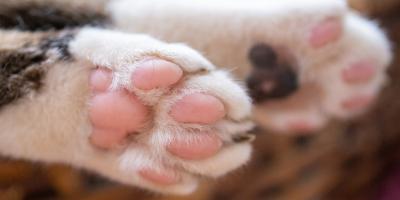Cat Coughing: Symptoms & When to Take Action


When your cat or kitten develops a cough, it’s natural to be concerned. Occasional cat or kitten coughing is normal but read on to learn more about when to take action.
It can be difficult to know when it’s a hairball, a mild (and temporary) irritation or something that requires veterinary treatment. A simple cough can get a bit more complicated when considering all the possible issues with the nose, throat and lungs that could cause cat cough symptoms.
This means the mystery of your cat’s cough is best left to your veterinarian to diagnose. While you wait for the appointment, it’s important to observe your cat’s cough and relay any relevant information to your veterinarian. A video recording of your cat coughing can be helpful for your veterinarian if you can catch them in the act.
Why is Your Cat Coughing? 8 Possible Reasons
Many cat owners ask their veterinarian questions like, I don’t know why my cat is coughing; could it be an allergy attack, asthma, or a lung infection?
Here are some of the more common reasons why your cat may be coughing more than usual:
- Asthma: Feline asthma can be triggered by pollen, mold, dust mites, smoke or other allergens that can cause inflammation of the airways when inhaled. Coughing is one of the many symptoms to look out for, but it’s usually not the only one.
Wheezing and rapid breathing, vomiting and lethargy are also signs they may have asthma.
Although feline asthma can’t be cured, there are many treatments available, including inhalers, injections and pills. These won’t make the underlying condition disappear but can help a cat breathe normally again and potentially lessen the frequency and severity of the attacks. Allergen testing is often recommended as well. This will narrow down the list of possible allergy triggers and, once you find out what is causing the asthma attacks, you can start minimizing their exposure to it. - Hairballs: Cat hairballs are a natural consequence of their self-cleaning habits. During their grooming process, cats swallow hair, which sometimes accumulates in their stomach and forms hairballs. Cats will generally try to eliminate the hairball through coughing and gagging (retching, which sounds like coughing but isn’t, is another way). This helps ensure the hairball doesn’t end up in their intestines, causing a blockage. Still, it can be disturbing for owners to see their cat struggling through the process.
Getting rid of a hairball is usually not a cause for concern; however, if you notice an increased frequency in coughing, retching and gagging, you should visit your veterinarian to rule out any other issues. - Pneumonia: Feline pneumonia is one of the more severe causes of cat coughing. You should immediately contact the veterinarian if your cat has any problems breathing or if you notice any discharge from the eyes or nose. Cough caused by pneumonia usually sounds wet or crackly.
Pneumonia is inflammation of the lungs, usually caused by an infection, resulting in fluid build-up inside the lungs. Left untreated, this condition can worsen, eventually prohibiting proper airflow into the lungs. This condition requires prompt attention and urgent treatment. - Respiratory Infections: A respiratory infection can also make your cat cough and wheeze. Viral, bacterial, or fungal infections are common pathogens in cats, and they often come with a lot of coughing, sneezing, sniffing and lethargy. Cats can also catch feline flu, so if you notice a runny nose or a change in appetite, this might explain all those sudden coughing fits. Fortunately, a kitten or a cat that’s up-to-date on their vaccinations has a lower chance of catching the flu.
If you notice a stubborn, unusual cough coming from your cat, talk to your veterinarian to see if you can rule out a respiratory infection. - Cancer: Cancer can also affect the respiratory tract. Sometimes, when tumors develop in the lungs, throat, nose or mouth, they can trigger a cat cough that won’t go away. Rapid breathing, lethargy or coughing up blood are some of the most common signs of lung cancer in cats. As with any type of cancer, catching it early can increase the chances of a favorable prognosis. So, keep an eye on any unusual changes in your cat’s behavior and symptoms and don’t hesitate to contact the veterinarian.
- Foreign Objects: Sometimes, your cat has inhaled a tiny object while exploring the house or outdoors and is now coughing up a storm to get rid of it. Even food can end up in the wrong place, leading to coughing. Although cats will do their best to expel foreign objects and food stuck in their airwaves through sneezing and coughing, these objects can sometimes become lodged. So, if your cat’s coughing doesn’t improve, it’s imperative to contact your veterinarian.
- Heartworm Disease: Heartworm disease can affect how the heart functions and can also damage the lungs, causing your cat to cough.
- Trauma: Injury to the respiratory tract may result in coughing, especially if they’re indoor/outdoor cats (but even indoor felines can have physical trauma).
When to Be Concerned About Why Your Cat is Coughing
Occasional coughing in cats can be harmless. Just like us, cats occasionally cough without needing any medical attention. But it’s important to note if the cough persists for days or if it’s particularly severe.
Fortunately, many of the conditions listed above, such as asthma or respiratory infections, can be treated or managed. Regardless of the cause, taking your cat to the veterinarian as soon as you become concerned is vital in ensuring your cat’s continued health.
For more cat health tips from our experts, visit our Pet Expertise page.
Related articles

Earn myPurina Rewards with Every Purchase
Use your points for treats, toys, and gift cards with myPurina app.






